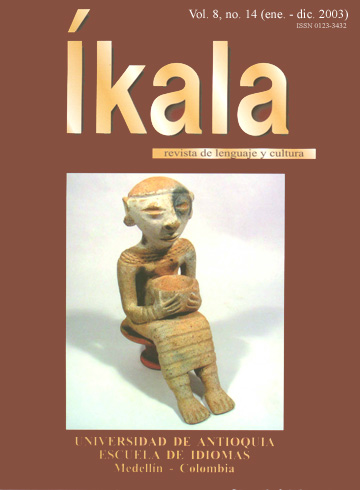*Quién está educando EFL maestros: un estudio cualitativo de en servicio en Colombia
DOI:
https://doi.org/10.17533/udea.ikala.3183Palabras clave:
educación a profesores, desarrollo profesional, educación continua, conferencias, capacitación docenteResumen
Este artículo reporta los resultados de un estudio cualitativo diseñado para explorar las necesidades de capacitación de los profesores de inglés como lengua extranjera. Las técnicas empleadas en la recolección de los datos incluyen grupos focales, un cuestionario y entrevistas a profundidad. Los resultados sugieren que muchos de estos docentes no pueden beneficiarse de las opciones profesionales propuestas por las instituciones de educación superior y que oportunidades de capacitación menos formales y estructuradas como los congresos del área y las charlas de las casas editoriales son vistas por muchos de ellos como los agentes reales a cargo de su educación. Se discuten las implicaciones de estas creencias para la profesionalización de los docentes.
Recibido: 25-08-03 / Aceptado: 29-09-03
Cómo referenciar este articulo:
González, A. (2003). Who is Educating EFL Teachers: a Qualitative Study of in-service in Colombia. Íkala. 8(1), pp. 153 – 172
Descargas
Citas
Arias, Clara, 1994, “Teacher Development: Meeting the Challenge of Changing Worlds”, Keynote speech at the 29th ASOCOPI Congress, Medellín, Colombia.
Debus, Mary, 1988, “The Handbook for Excellence in Focus Group Research Academy for Educational Development”, HEALTHCOM or the Communication and Marketing for Child Survival Project, U.S. Agency for International Development.
Ducharme, Edward, 1986, “Teacher Educators: What do We Know?”, ERIC Clearinghouse on Teacher Education Washington DC., ERIC Identifier: ED279642.
Freeman, Donald, 1998, Doing Teacher Research: from Inquiry to Understanding, Newbury House.
Freeman, Donald and Jack.C., Richards, (eds.), 1996, Teacher Learning in Language Teaching, Cambridge University Press.
Freeman, Donald, 1996, “Renaming Experience/Reconstructing Practice. Developing New Understanding of Teaching”, in: Freeman, Donald and Jack.C., Richards, (eds.), 1996, Teacher Learning in Language Teaching, Cambridge University Press.
Gibbs, Anita, 1997, “Focus Groups”, Social Research Update, 19, University of Surrey, http://www.soc.surrey.ac.uk/sru/SRU19.html
González, Adriana and Quinchía, Diana, 2003, “Tomorrow’s EFL Teacher Educators”, Colombian Journal of Applied Linguistics. (In press) González, Adriana, Claudia Montoya, Nelly Sierra , 2002, “What do EFL Teachers Seek in Professional Development Programs? Voices from Teachers”, http:// quimbaya.udea.edu.co/~ikala/vol7_2.html
______________, 2001, “EFL Teachers Look at Themselves: Could They Grow Together?”, HOW Journal of the Colombian Association of English Teachers, Special issue, 9, 27-33.
Johnson, Karen, 2002, “Second Language Teacher Education”, TESOL Matters, 12, http://www.tesol.org/pubs/articles/2002/tm12-2-02.html
______________, (ed.), 2000, “Teacher Education. Case Studies”, in: TESOL Practice Series. Teachers of English to Speakers of Other Languages.
Kvale, S., 1996, InterViews: An Introduction to Qualitative Research Interviewing, London, Sage.
Kumaravadivelu, B., 1994, “The Postmethod Condition: (E)merging Strategies for Second/foreign Language Teaching”, TESOL Quarterly, 28 (1), 27-48. Maslow, Abraham, 1970, Motivation and Personality, 2nd ed., Harper & Row. McNamara, Carter, 1999, “Basics of Conducting Focus Groups”, http:// www.mapnp.org/library/evaluatn/focusgrp.htm Morgan
D.L., 1988, Focus Groups as Qualitative Research, Newbury Park. Cal., Sage Publications.
Norwood, George, 1996, “Maslow’s Hierarchy of Needs”, http://www.connect.net/ georgen/maslow.htm
National Center for Education Statistics, 1998, Teacher Quality: A Report on the Preparation and Qualifications of Public School Teachers. United States Department of Education, http://nces.ed.gov/surveys/frss/publications/1999080/ index.asp Richards, Jack, 1998, Beyond Training, New York, Cambridge University Press.
______________, 1990, “The Dilemma of Teacher Education in Second Language Teaching”, in: Richards, Jack and Nunan, David, Second Language Teacher Education, Cambridge University Press.
Woodward, Tessa, 1991, Models and Metaphors in Language Teacher Training, Loop Input and Other Strategies, Cambridge University Press.
Descargas
Publicado
Cómo citar
Número
Sección
Licencia
Derechos de autor 2003 Íkala, Revista de Lenguaje y Cultura

Esta obra está bajo una licencia internacional Creative Commons Atribución-NoComercial-CompartirIgual 4.0.












